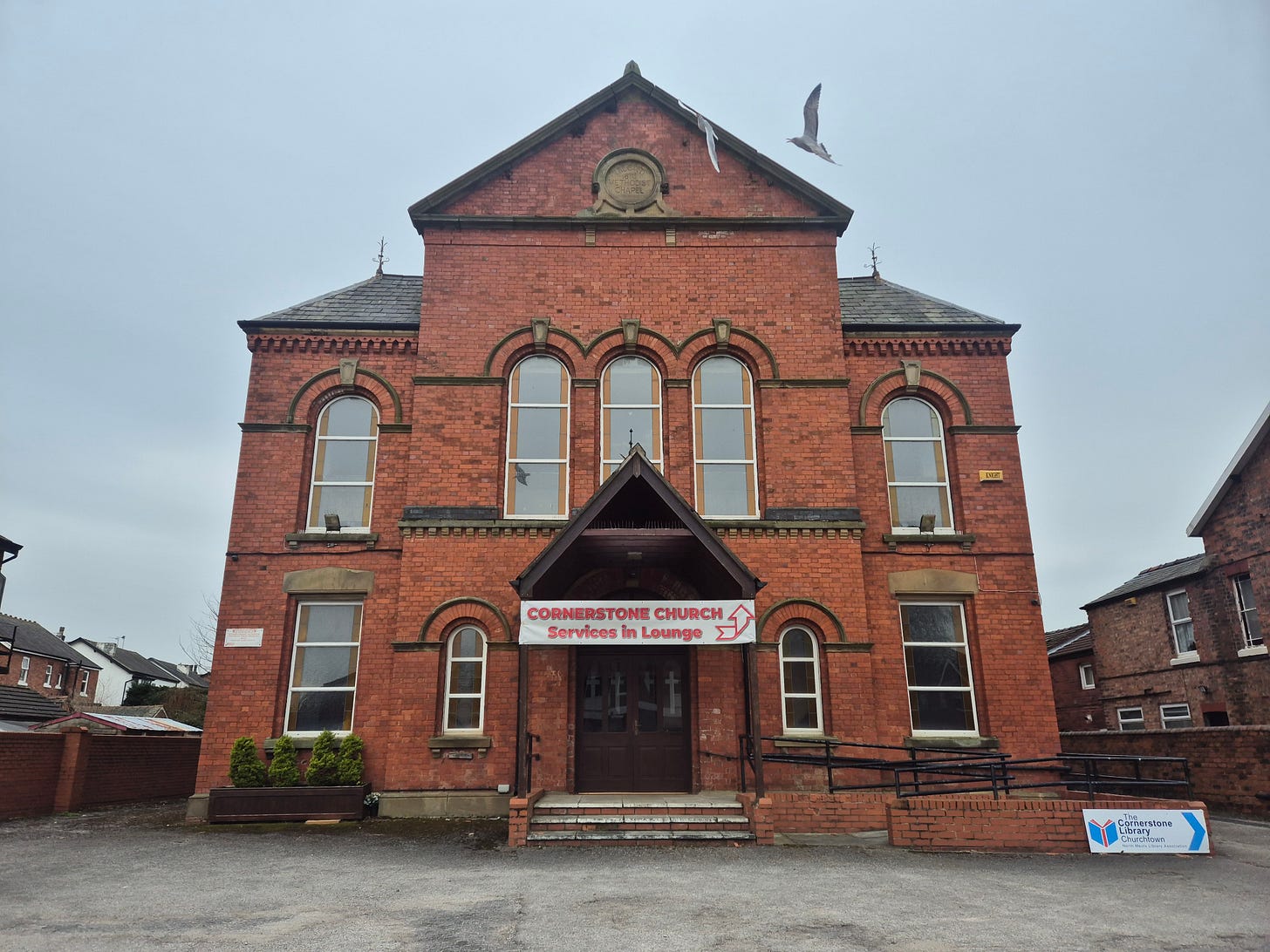Demolition threat shows battle facing town's churches
Plus: Andrew Brown's What's On guide for the half-term week
Hello and welcome to the 11th edition of The Southport Lead.
Today’s newsletter takes a look at the potential loss of one of Southport’s oldest churches along with what it means in a wider context. The Cornerstone Methodist Church - near Churchtown lights - is available for sale with a press tag above £1.1 million.
While the trustees want to keep a religious facility on whatever development comes next - likely housing - the fact such a grand building is no longer needed is indicative of the reduced attendance at religious centres.
Southport has a long history with the Methodist movement but attendance is declining and two such facilities have been lost for good in recent years. Cornerstone could hold 700 worshippers when it was first built but now it no longer has such need and has extensive structural issues which are beyond the church’s budget.
I write about pub closures and the community effect they have on a fairly regular basis and while I’m not religious, it’s important to remember that when places of worship close down there are people who are left without a place to attend with like-minded others and feel a sense of togetherness.
As society becomes more secular and cultural activities change, the community must find new ways to bring people together - this is something I’m keen to look at in a future edition so if you have any thoughts, please get in touch at jamie@thelead.uk.
Also in today’s edition are the latest headlines from across the town, news of the huge budget pressures facing Sefton Council, and a half-term special of Andrew Brown’s What’s On guide to the week ahead.
Sale and demolition loom for historic church - so what next for Southport’s Christian faith?
One of Southport’s oldest churches could be demolished to make way for housing with the building listed for sale.
The Cornerstone Methodist Church - formerly known as Marshside Methodist Church - has been available with an asking price above £1.1million.
According to the listing with Fitton Estates, the managing trustees of the church would like to see proposals which include a new “multifunctioning facility” to continue its services.
While the possibility of redeveloping the existing building is also to be considered, structural reports have indicated that the cost of restoring its structural issues would be above £1 million.
The church’s original chapel of worship is thought to date back to 1876 with the other facilities such as the church hall, library, kitchen and caretaker’s flat more recent additions. Along with these, the sale would come with more than an acre of land behind the church and this is where much of the residential properties would be situated. A drawing included with the property listings suggests it could be used for 10 houses and a three-storey apartment block.
The Methodist movement has been present in Southport pretty much since the birth of the town. From a first cottage meeting in 1806, Sugar Hill Chapel was built in 1816 and a series of churches were built in various emerging areas throughout the 19th century with financial support from notable figures including John Fernley.
Sir William Hartley - the jam maker and father of Southport’s first female mayor Christiana - was another financial supporter in the early 20th century, funding the building of what is now St Mark’s Church.
In Marshside specifically, Primitive Methodist magazine’s records show that James Kellett preached on a green in Knob Hall Lane in 1827 and within five years a small chapel was built nearby.
The original chapel that is now Cornerstone was built in 1878 to accommodate 700 people and was extended further in 1896.
But while Methodism has strong roots in Southport, it is not immune to the challenges facing religious groups in an increasingly secular society.
For the first time, the 2021 census showed less than half of the population in England and Wales described themselves as Christian (46.2% compared to 59.3% in 2011).
The same survey found “no religion” to be the second most common response, with a rise from 25.2% (14.1 million) to 37.2% (22.2 million).
Locally, the Christian population is higher than the national average but seemingly not enough to ensure the future of its churches. The Sefton-wide figure for people identifying as Christian stood at 64.4% and in Marshside specifically it’s 63.4%. For ‘no religion’, it was 28.6% across Sefton and 29.9% in Marshside
The likely loss of Marshside’s Methodist Church follows on from recent closures in both Crossens and Banks. The Crossens church closed down in 2019 - when it merged with Marshside to become Cornerstone - and the building has since been converted into a recording studio.
The Banks site remains empty since its religious use ended in 2021 but was listed for sale last year. It had been a fixture in the village for 150 years before declining numbers left it unviable.
Speaking ahead of its final service, lay preacher Lawrence Baxter told me of his sadness o fthe demise of both the church and the wider Methodist movement.
He said: “One of the main reasons the church is closing is a theological reason. Christian morality outlook is based on the scriptures and we know the world is becoming increasingly secular and moving away from Christianity.
“Our church suffers from what other churches suffer from in aging demographics and reduced numbers.”
Lawrence also cited the pandemic and changes made at national level for bringing forward the reduction in worshipper numbers. He added: “Part of the reason is the divergence with the Methodist way of teaching.
“For Christians who maintain their faith based on the Bible and the word of God, it’s difficult to live with the way the Methodist church is becoming increasingly secular.”
He is not the only one to share concerns for the future of Methodism. Dr John Hayward, a visiting fellow at the University of South Wales, forecasts that the movement could be extinct within two decades.
Using the R rate model - which was seen during the Covid pandemic - to analyse falling worshipper numbers, he estimated Methodism would be extinct by the mid-2040s.
Explaining his methodology to Christian news service Premier, he said: "It’s a good way because churches often grow through personal contact between somebody who was in the church and people who are outside the church.
"So someone who's in the church might invite somebody to a service, they might even, better, tell somebody about Jesus Christ. Then that person may come to a service, they may hear a sermon and they become a Christian and that faith has been passed on by word of mouth. Word of mouth operates in the same way as a disease, it's a contact between one person and another.
“The more people are doing that contact and the more effective contacts they have, the more the faith will be spread in the same way that a disease would be spread.
“What the models are showing is that these churches will become extinct. For some of the churches that is embarrassingly close and they may not survive past those dates and that is quite frightening.”
Despite these challenges, Southport Methodist Circuit still has eight churches across Southport and Formby. The Cornerstone church also serves as a valuable base for other activities - including parent and baby groups and Boys' Brigade and Girls' Association meetings - and is home to the independently run Cornerstone Library.
A spokesperson for the Methodist Church said: “Cornerstone Methodist Church in Southport has a vibrant worshipping community that meets every Sunday with regularly activities throughout the week.
“Although the chapel that fronts onto Marshside Road is currently not in use due to its condition, the halls and rooms behind the Chapel continue to serve the community well.
“It would be uneconomic to repair the Chapel, and therefore the Church Council has decided to sell the larger-than-usual land on which the church is built. Cornerstone Methodist Church hopes that as part of the redevelopment of the site, a new church can be built that can continue to serve the community.”
Social care costs leave Sefton with budget blackhole
By Elliot Jessett
Sefton Council has reported a £17.8m blackhole in its finances after overspending its budget and identified three significant risks to financial sustainability. The ominous warning came at Bootle Town Hall on Thursday when senior finance officer Stephan Van Arendsen outlined the local authority’s budget estimates to cabinet.
Mr Van Arendsen presented a report which confirmed the council’s net overspend of £17.8m on its General Fund (excluding mitigations) and cited three main pressures – the education travel support budget, adult social care, and children’s social care. The report stated: “The most significant pressure has arisen within the children’s social care budget.
“A new staffing structure was approved by members and has now been implemented, however expensive agency staff have been required to remain in place during implementation and to cover vacancies due to the structure being larger than the previous arrangement.
“The largest pressure however has come from the residential placement budget.”
Adding clarity for elected members, Mr Van Arendsen said: “The sector and councils are changing. It’s not like it was five years ago, where councils have modest overspends one or two million.
“You look across the city region, you look across Manchester city region, which the council’s benchmark against, there’s a lot of councils with overspends the size of this, predominantly through children’s services. It’s a sector-wide issue.
“The sector is under extreme pressure because of what’s gone on in the last 10 to 15 years. The government has made the first step in terms of trying to address that and I point members to the recovery grants and the value of the recovery grant that the council’s have in this settlement,
“That needs to continue to focus on lobbying for more money for local governments and supporting areas like Sefton. The big issue is demand and need.”
Leader of Sefton Council, Cllr Marion Atkinson responded to the finance report, she said: “It’s evidence that the system is broken and that after 14 years of austerity, this needs immediate attention.
“Thankfully, the government has listened to councils like us. The promise of the fixed term settlement for the following three years, I believe will bring stability and the ability to make longer term financial decisions, and that is welcome.”
News in headlines
'Funny, kind Semina lit up room': 12-year-old's tragic overdose death (BBC)
Town 'overlooked and disregarded' by Network Rail plans (Liverpool Echo)
Silent discos held in schools as funds raised for mental health charity (Stand up for Southport)
Many thanks for reading this latest edition of The Southport Lead. If you haven’t already, please do sign our petition to Save Southport Pier and also spread the word about The Southport Lead too.
If you have something you think we should know about we’re on southport@thelead.uk and now to our what’s on feature, which is only for paid subscribers. So if you can please consider a paid subscription by tapping below to receive Andrew Brown’s guide each week and help support us to bring The Southport Lead to your inbox every Wednesday and Sunday too.
What’s on this week
By Andrew Brown
Southport is getting busy with families looking to enjoy their Half Term holidays and there is lots to enjoy with bears, with dinosaurs, Ukrainian Day, and with the town’s Carousel back open after its winter break.
Keep reading with a 7-day free trial
Subscribe to The Southport Lead to keep reading this post and get 7 days of free access to the full post archives.





